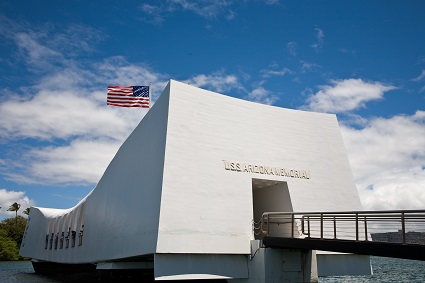Reflections from Pearl Harbor #41
Some of you may not want to read this, it’s a different type of post. It’s a recap of our visit to the USS Missouri Memorial at Pearl Harbor which was a sobering experience to say the least. Thoughts of all who’ve served, as well as my Dad and brother (who were both in the service) ran through my brain as I lamented all who died in WWII.
Like most people, I struggle to keep a positive attitude when I visit places like this, though I know it’s necessary and important to stay present to the atrocities of war. People don’t talk much during tours of these memorials anywhere in the world; we all seem to be struggling with the realities they bring to the forefront of our brains and those connections we have to the people no longer with us and far more we’ve never met. The numbers and details are staggering and at some point, we were each saturated with our own somber reality ready to leave the location and try to immerse ourselves in the denial of far lighter topics.
I was struck by two quotes through the day, one was an unpublished excerpt from a War Correspondent named Ernie Pyle that was a draft discovered amongst his personal belongings upon his death on the Pacific Island of Ie Shima, April 18, 1945. I had no idea he was a household name back then; my Dad would most certainly have known that, but my limited historical knowledge of that era didn’t prevent me from being completely struck by the excerpt they found.
It said: “there are many of the living who have had burned into their brains forever the unnatural sight of cold dead men scattered over the hillsides and in the ditches along the high rows of hedge throughout the world.
Dead men by mass production – in one country after another – month after month and year after year.
Dead men in winter and dead men in summer.
Dead men in such familiar promiscuity that they become monotonous.
Dead men in such monstrous infinity that you come almost to hate them.
These are the things that you at home need not even try to understand. To you at home they are columns of figures, or he is a near one who went away and just didn’t come back. You didn’t see him lying so grotesque and pasty beside the gravel road in France.
We saw him, saw him by the multiple thousands. That’s the difference…”
Framing his letter were photos of a dead soldier and another with one soldier carrying a body through the field. Next to his letter was the quote which has stayed with me from Elenore Roosevelt which said, “As long as there must be war, I ask and must answer, was I worth dying for?”
That wall, in the center of the ship, was what I left with. Was I worth dying for? What a profound question to ask as I continue to enjoy the freedom, joys and challenges life affords me thanks to all the people whose lives were lost and to those who continue to serve.
I need to keep this question close as I bump into the petty grievances of my day to day. I intend for it to guide me to be a kinder, more powerful and more forgiving person when I might otherwise complain or react. I want to be able to answer that question with a resounding YES, but I can’t do so with confidence just yet. I have work to do.
We must never forget.
